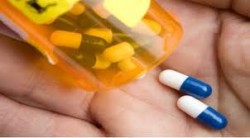Prescription Drug Rehab
Prescription drug addiction is somewhat of a pandemic in the United States. In fact, thousands of people now suffer from a dangerous and potentially deadly addiction to prescription drugs ranging from anti-anxiety medications to painkillers. If you or someone you love is addicted to prescription medications and you’re feeling like there is little hope for recovery, don’t give up. There is help!
Prescription drug rehabilitation programs provide options for those who are addicted to prescription medications to safely detox, effectively overcome physical drug dependence and take back control of the way that their lives were before they ever took that first dose. Here you will find information to help you understand what type of drug rehab will be most suitable for your needs, what to expect when you enter treatment and how you can make the most out of your recovery efforts.
Types of Drug Rehab
Although it may seem hopeless when you are addicted to drugs, there is help available and many methods of drug rehab have been developed to assist those who suffer from this devastating disease. Many types of drug rehab are available to provide around-the-clock care or even limited care services, drug abuse monitoring, testing, medical care and other methods of treatment to ensure that patients can ease their symptoms, feel better and receive appropriate emotional support that will get them on the right track to making a full and lasting recovery.

Prescription drug rehab can help you through your addiction.
Inpatient drug rehab is one of the most common methods of treatment for those who suffer from prescription drug addiction. Because many prescription drugs are so highly physical in scope of their addictive qualities, most inpatient drug rehab programs have heavily guarded drug detoxification programs that provide the foundation for recovery from physical dependence. During drug detox, a range of symptoms that may be quite difficult to cope with can present. These symptoms will depend greatly on the level of addiction as well as the actual type of medication that the patient is addicted to but may include:
- nausea
- vomiting
- upset stomach
- cramps
- bone or muscle pain
- insomnia
- fatigue
- flu-like symptoms
- anxiety
- agitation
- depression
These are just a few of the potential symptoms that may become present during prescription drug detox and the early days of recovery. Although these symptoms may seem unbearable at times, treatment is available for many of the withdrawal symptoms that can at least ease the pain, make the process a bit more manageable and help you get through the emotional and physical ups and downs that come from this process of detoxing from medications.
Outpatient drug rehab is also an option for those who are addicted to prescription drugs but if the addiction is severe, has major physical aspects or proper detox has yet to be completed, outpatient rehab is not likely to provide an effective means of care. For those who do choose to seek the help of an outpatient center, adequate support will be needed at home to help you stay on the right path and to continue to abstain from drug abuse even in trying times when you wish you could take just one dose or one pill.
Methods of Counseling in Rehab
Regardless of the type of drug rehab you choose, there will be counseling provided to assist you in overcoming the psychological aspects and dependence on your medication of choice. Counseling in prescription drug rehab is typically provided in one of two forms: individual counseling and group counseling. Most rehab programs utilize a combination of both methods of counseling to ensure the successful recovery for the addict. Each type of counseling serves a slightly different purpose in the overall plan for recovery.
- Individual Counseling – used to provide the patient with a one-on-one, trusted relationship between patient and counselor in which anything and everything may be discussed. These sessions are private and the information disclosed will not be told to anyone else. These sessions are ideal at helping the patient to cope with traumatic experiences and abuse which may be at the root of their reasons for using prescription medications in the first place
- Group Counseling – these sessions provide a means of getting a group of recovering addicts together to share their stories of success, share their struggles and simple to talk with one another about their addiction. Group counseling for prescription drug addicts is a positive method of providing patients with a way to socially integrate and learn how to cope in an environment with others.









